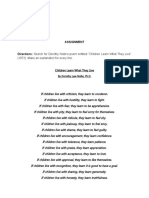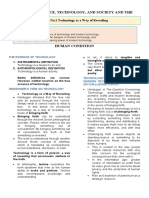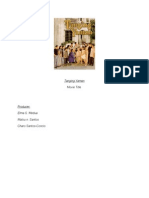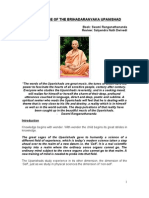50%(2)50% found this document useful (2 votes)
750 viewsNatural Law of Tenets
Natural Law of Tenets
Uploaded by
Aphrodite MoldeThe document discusses St. Thomas Aquinas' views on natural law and its tenets. It states that natural law exists to sustain individual life, is immutable, and upholds the individuality of human life. It also discusses that natural law grants no authority over others and refuses all authority except its own. Finally, it provides context on St. Thomas Aquinas and his views that perfect happiness is not possible on earth but imperfect happiness is, and discusses the four cardinal virtues of prudence, temperance, justice, and fortitude.
Copyright:
© All Rights Reserved
Available Formats
Download as PPTX, PDF, TXT or read online from Scribd
Natural Law of Tenets
Natural Law of Tenets
Uploaded by
Aphrodite Molde50%(2)50% found this document useful (2 votes)
750 views21 pagesThe document discusses St. Thomas Aquinas' views on natural law and its tenets. It states that natural law exists to sustain individual life, is immutable, and upholds the individuality of human life. It also discusses that natural law grants no authority over others and refuses all authority except its own. Finally, it provides context on St. Thomas Aquinas and his views that perfect happiness is not possible on earth but imperfect happiness is, and discusses the four cardinal virtues of prudence, temperance, justice, and fortitude.
Original Description:
Natural Law of Tenets Ethics
Copyright
© © All Rights Reserved
Available Formats
PPTX, PDF, TXT or read online from Scribd
Share this document
Did you find this document useful?
Is this content inappropriate?
The document discusses St. Thomas Aquinas' views on natural law and its tenets. It states that natural law exists to sustain individual life, is immutable, and upholds the individuality of human life. It also discusses that natural law grants no authority over others and refuses all authority except its own. Finally, it provides context on St. Thomas Aquinas and his views that perfect happiness is not possible on earth but imperfect happiness is, and discusses the four cardinal virtues of prudence, temperance, justice, and fortitude.
Copyright:
© All Rights Reserved
Available Formats
Download as PPTX, PDF, TXT or read online from Scribd
Download as pptx, pdf, or txt
50%(2)50% found this document useful (2 votes)
750 views21 pagesNatural Law of Tenets
Natural Law of Tenets
Uploaded by
Aphrodite MoldeThe document discusses St. Thomas Aquinas' views on natural law and its tenets. It states that natural law exists to sustain individual life, is immutable, and upholds the individuality of human life. It also discusses that natural law grants no authority over others and refuses all authority except its own. Finally, it provides context on St. Thomas Aquinas and his views that perfect happiness is not possible on earth but imperfect happiness is, and discusses the four cardinal virtues of prudence, temperance, justice, and fortitude.
Copyright:
© All Rights Reserved
Available Formats
Download as PPTX, PDF, TXT or read online from Scribd
Download as pptx, pdf, or txt
You are on page 1of 21
At a glance
Powered by AI
The passage discusses the tenets of natural law according to St. Thomas Aquinas and also talks about cardinal virtues and Aquinas' view on human happiness.
The tenets of natural law according to St. Thomas are that it is to be respected, it is of man not for man, it is objective not subjective, it is immutable, it upholds individuality of human life, it grants no authority and refuses all authority, and it admits no trespass.
The four cardinal virtues are prudence, temperance, justice, and fortitude.
Natural
Law and it’s
Tenets
(St. Thomas)
1. NATURAL LAW IS TO
BE RESPECTED; NOT
OBEYED
> Every living man, woman,
and child have free will choice
to respect natural law, treat it
with belligerence, or contempt
and refuse it.
2. NATURAL LAW IS
OF MAN; NOT FOR
MAN
> Because the content of free will mind
is not so governed, Creator has
endowned man with a conscience, and
an emotional faculty which propmt and
impel that man should choose life
supporting goals.
3. NATURAL LAW IS
OBJECTIVE, NOT
SUBJECTIVE
> Natural laws exist to sustain every
individual’s life. Transfer these into
Man’s societal dealings with others
and not one thing changes. Personal
desire does not translate to what
government approves. Diligent
application of one’s efforts does not
mean obeying artificial laws.
4. NATURAL LAW IS
IMMUTABLE
> Natural law is inviolate. It
cannot be overruled by any
Man or any construct of Man
without self-confessing (by
such action) the unlawful
authority so to do.
5. NATURAL LAW UPHOLDS
THE INDIVIDUALITY OF
HUMAN LIFE.
> This is the primary natural law
tenets. Wherein the individuality of
the person cannot be fused upon
the life of one's entity because we
all have uniqueness and rights on
what we want to do on our lives.
6. NATURAL LAW
GRANTS NO
AUTHORITY.
> This means that natural law
doesn't permit one individual
to command another. The
principle of integrity is self
evident .
7.NATURAL LAW REFUSES
ALL AUTHORITY.
> Natural Law denies all
authority save its own, whether
from a partner, neighbor, pulpit,
parliament, congress, or any
other source.
8.NATURAL LAW
ADMITS NO TRESPASS
> Whosoever (knowingly)
initiates the use of physical or
coercive force, or fraud
against others, negates and
paralyses the victim’s means
of survival.
. Two persons cannot be free and
equal, when one of them is
controlling, managing,
threatening, blackmailing or
extorting the other. Crime is not
committed by free persons, but
by those who have chosen to
sacrifice their autonomy. Outlaws
are not free
9. NATURAL LAW AND
POSITIVE LAW ARE
ANTI-ETHICAL.
> Natural Law and Positive
Law apply to different things,
so cannot be alternative
systems of rules applicable to
the same thing.
10. THE NATURAL LAW
SUPPORTS ONE'S LIFE,
RESPECTFUL OF ALL OTHERS.
> Integrity, lawfulness, and justice are
the foundation and culmination of natural
law, the full expression and
manifestation of mind, body, and soul
having respect to human life.
ST. THOMAS
AQUINAS
Aquinas is uncompromising in
his view that our true happiness
can only be found in knowledge
of God. No other worldly good
or pleasure can truly provide us
with the ultimate good we seek
>He sets out a systematic answer to the
question of WHAT HUMAN HAPPINESS
IS, and WHETHER IT CAN BE OBTAINED
IN THIS LIFE.
> His ultimate answer is that PERFECT
HAPPINESS (BEATITUDO) is not possible
on earth, but AN IMPERFECT HAPPINESS
(FELICITAS) is.
“Happiness” is the classical sense of
Eudamonia, meaning to lead a good
and virtuous life from a Greek and
Roman philosophy and later expanded
upon by Christian thinkers like saint
Augustine and Saint Thomas.
The four cardinal Virtues:
Prudence
Temperance
Justice
Fortitude
Prudence guides the
judgment of our conscience
in discerning our true good
and in applying moral
principles to particular
circumstances.
“Temperance” moderates
the attraction of pleasures
and provides balance in the
use of created goods.
Justice is the virtue that
consists in giving to God and
neighbor what is due to
each, giving to them what
rightly belongs to them.
Fortitude or courage in the
face of these challenges,
goes to work. Fortitude
provides the ability to
persevere in adversity.
You might also like
- Virtue EthicsDocument15 pagesVirtue EthicsClarise Jimenez100% (1)
- Frameworks and Principle of DispositionDocument41 pagesFrameworks and Principle of DispositionCookie MonsterNo ratings yet
- GEC 111 - Understanding The Self October 2, 2019Document1 pageGEC 111 - Understanding The Self October 2, 2019Sibal P. Idno100% (1)
- Lesson 1: Philosophy: Socrates and PlatoDocument7 pagesLesson 1: Philosophy: Socrates and PlatoNerish PlazaNo ratings yet
- Foundations of Philippine Education: Task No. 2Document4 pagesFoundations of Philippine Education: Task No. 2Karen Nicole Borreo MaddelaNo ratings yet
- Republic Act No.9163Document8 pagesRepublic Act No.9163Rosechielline ReyesNo ratings yet
- UTS Module 3 For PrintingDocument37 pagesUTS Module 3 For PrintingKristine CruzNo ratings yet
- Lesson 7 The Good LifeDocument2 pagesLesson 7 The Good LifeChristine Mae Tinasas Huesca100% (2)
- Do You Really Know Yourself?Document64 pagesDo You Really Know Yourself?Angela Martires100% (2)
- Assignment: by Dorothy Law Nolte, PH.DDocument4 pagesAssignment: by Dorothy Law Nolte, PH.DZany Calunod Cañal100% (1)
- NSTP Module 101Document24 pagesNSTP Module 101Angela SedanoNo ratings yet
- My Ideal Self: Student:Astrid Carolina Rodriguez DiazDocument14 pagesMy Ideal Self: Student:Astrid Carolina Rodriguez DiazALEJANDRA RODRIGUEZNo ratings yet
- NSTP PrelimDocument24 pagesNSTP PrelimtrishaNo ratings yet
- How Would I Characterize MyselfDocument1 pageHow Would I Characterize MyselfTino SalabsabNo ratings yet
- ReEd 16112 Case AnalysisDocument2 pagesReEd 16112 Case AnalysisRonna Mae DungogNo ratings yet
- "I Know That I Don't Know": Lesson 1: Philosophy SocratesDocument15 pages"I Know That I Don't Know": Lesson 1: Philosophy SocratesMariam GamosNo ratings yet
- Gec 1 Module 1Document14 pagesGec 1 Module 1Mohammad Ryyan PumbagulNo ratings yet
- Osias Colleges Inc. F. Tanedo St. San Nicolas, Tarlac City Tel. No. 045-982-02-45 Learnng Activity SheetDocument2 pagesOsias Colleges Inc. F. Tanedo St. San Nicolas, Tarlac City Tel. No. 045-982-02-45 Learnng Activity SheetZacarias GarciaNo ratings yet
- Ge006 Midterm Lesson 3.2Document17 pagesGe006 Midterm Lesson 3.2Ramil BillonesNo ratings yet
- Ethics ModuleDocument3 pagesEthics ModuleCristy RamboyongNo ratings yet
- Ge01 Module 1Document56 pagesGe01 Module 1Walang PangalanNo ratings yet
- NSTP 2.3.2-Information Sheet TeamBuildingDocument2 pagesNSTP 2.3.2-Information Sheet TeamBuildingVeraniceNo ratings yet
- NSTP LTS A - Reflection About Creative LearningDocument2 pagesNSTP LTS A - Reflection About Creative LearningVincent Jay BalocaNo ratings yet
- Revised UTS Reviewer MidtermsDocument3 pagesRevised UTS Reviewer MidtermsJT playz15No ratings yet
- Understanding The SelfDocument3 pagesUnderstanding The SelfMichael John PedrajasNo ratings yet
- Midterm Lesson 1 4 StasDocument9 pagesMidterm Lesson 1 4 StasKang ChulNo ratings yet
- Is Morally Permissible in Order To Prevent A Greater EvilDocument3 pagesIs Morally Permissible in Order To Prevent A Greater EvilSuperGirl_miKNo ratings yet
- Baring, Myron GE - 1 F My Best Presentation of My Physical SelfDocument12 pagesBaring, Myron GE - 1 F My Best Presentation of My Physical SelfRAQUEL VILLAROSA100% (1)
- InstructionsDocument5 pagesInstructionsKeziah VenturaNo ratings yet
- Activity 7 TCW (300 To 500 Words Per Question) 1. What Is in Your Own View About The Ethical Obligation of A Global Citizen?Document2 pagesActivity 7 TCW (300 To 500 Words Per Question) 1. What Is in Your Own View About The Ethical Obligation of A Global Citizen?Persephone KoreNo ratings yet
- Lesson 1 Doing Philosophy: Let's ExamineDocument23 pagesLesson 1 Doing Philosophy: Let's ExamineN-jel Micu100% (1)
- Should Heinz Have Stolen The DrugDocument1 pageShould Heinz Have Stolen The DrugBethymay EspinosaNo ratings yet
- Self CareDocument52 pagesSelf CareJhianne Mae Albag0% (1)
- NSTP - CWTS 2 - Module 1Document3 pagesNSTP - CWTS 2 - Module 1Dale Calica0% (1)
- The Essence and Varieties of LawDocument4 pagesThe Essence and Varieties of LawjustinmarvillamorNo ratings yet
- 4 EthicsDocument15 pages4 EthicsElizabethNo ratings yet
- ActivityDocument8 pagesActivitysakshisachdeva3480% (1)
- Unit 3 - Activity 1 - Activity On The Song Entitled Anak by Freddie AguilarDocument1 pageUnit 3 - Activity 1 - Activity On The Song Entitled Anak by Freddie AguilarKryztell Marie Alar Villaraza100% (1)
- Lesson1 Act#1Document2 pagesLesson1 Act#1mattNo ratings yet
- Western and Eastern Views of Man PDFDocument6 pagesWestern and Eastern Views of Man PDFNIkolai CastilloNo ratings yet
- HumanitiesDocument2 pagesHumanitiesGrace RoselioNo ratings yet
- Group 8. Ethical RequirementsDocument12 pagesGroup 8. Ethical RequirementsArisa AdaoNo ratings yet
- Human Flourishing Through Progress and De-DevelopmentDocument1 pageHuman Flourishing Through Progress and De-DevelopmentMark BrosotoNo ratings yet
- NSTP Chapter 3Document32 pagesNSTP Chapter 3Grecel Joy BaloteNo ratings yet
- Lesson 7 - Media and GlobalizationDocument14 pagesLesson 7 - Media and GlobalizationBpNo ratings yet
- Technology As A Way of RevealingDocument4 pagesTechnology As A Way of RevealingGeemaica MacaraigNo ratings yet
- Tanging YamanDocument4 pagesTanging YamanRoxanne ArellanoNo ratings yet
- Module 5 Week 6Document18 pagesModule 5 Week 6Maureen D. FloresNo ratings yet
- Health Vs FitnessDocument5 pagesHealth Vs FitnessAmy RathoreNo ratings yet
- Being MoralDocument2 pagesBeing MoralShaika HaceenaNo ratings yet
- Answers Ge 10 Module 1Document8 pagesAnswers Ge 10 Module 1isagani abrilNo ratings yet
- Name & Course: Jehoshua Daniel N. Cuarteros BSME - 1B Application and AssessmentDocument2 pagesName & Course: Jehoshua Daniel N. Cuarteros BSME - 1B Application and AssessmentChristineNo ratings yet
- Chapter 2 RPHDocument32 pagesChapter 2 RPHRephraimNo ratings yet
- Institute of Arts and SciencesDocument7 pagesInstitute of Arts and SciencesArnel Pamaos Lopiba MontañezNo ratings yet
- Physical SelfDocument48 pagesPhysical SelfCharlene MalantaNo ratings yet
- The Western and Eastern Concepts of SelfDocument3 pagesThe Western and Eastern Concepts of SelfTakumi Shawn HinataNo ratings yet
- UTS Module Version 2-1Document82 pagesUTS Module Version 2-1Shakira Chu100% (2)
- LESSON 3-KANT and RIGHT THEORISTSDocument11 pagesLESSON 3-KANT and RIGHT THEORISTSCyrine ParrenoNo ratings yet
- The Case for Masks: Science-Based Advice for Living During the Coronavirus PandemicFrom EverandThe Case for Masks: Science-Based Advice for Living During the Coronavirus PandemicNo ratings yet
- St. Thomas and His Natural Law Theory and Its Tenets - ETHICSDocument9 pagesSt. Thomas and His Natural Law Theory and Its Tenets - ETHICSjennyrose.navajaNo ratings yet
- Bindu 480Document4 pagesBindu 480Daniel ParrasalesNo ratings yet
- The Message of The Brihadaranyaka Upanishad 1Document10 pagesThe Message of The Brihadaranyaka Upanishad 1Satyendra Nath DwivediNo ratings yet
- Group 1 - Robinson CrusoeDocument8 pagesGroup 1 - Robinson CrusoePhương NguyễnNo ratings yet
- The Idea of The HolyDocument3 pagesThe Idea of The HolyYehonatan Elazar-DeMota100% (2)
- The Hidden Hindu by Akshat Gupta (Pdfarchive - In)Document65 pagesThe Hidden Hindu by Akshat Gupta (Pdfarchive - In)Satyam SharmaNo ratings yet
- Bentley (Indo-European Migrations)Document7 pagesBentley (Indo-European Migrations)Sona SahakyanNo ratings yet
- Apologetics, Kreeft Chapter 6: MiraclesDocument18 pagesApologetics, Kreeft Chapter 6: MiraclesrichardNo ratings yet
- Easter Sunday Message21st April 2019Document3 pagesEaster Sunday Message21st April 2019Okokon BasseyNo ratings yet
- PietaDocument2 pagesPietaVitz IgotNo ratings yet
- Mughal PeriodDocument16 pagesMughal PeriodRatneshwar DubeyNo ratings yet
- Docucom PDF Trial: Sola Scriptura: The Erosion of AuthorityDocument4 pagesDocucom PDF Trial: Sola Scriptura: The Erosion of Authoritythelightheartedcalvinist6903No ratings yet
- Advantages of DecentralizationDocument2 pagesAdvantages of DecentralizationsherlexisNo ratings yet
- Grade 6 Cre NotesDocument19 pagesGrade 6 Cre NotesabetteramosNo ratings yet
- Ancient IndiaDocument40 pagesAncient IndiaKingston Maria InfantNo ratings yet
- Muslim Brotherhood The Globalists Secret WeaponDocument47 pagesMuslim Brotherhood The Globalists Secret WeaponAmy Bass100% (1)
- Law As Product of Traditional ChangeDocument2 pagesLaw As Product of Traditional Changeaniket aryan100% (1)
- Fernando Pessoa - The Art of Effective Dreaming PDFDocument8 pagesFernando Pessoa - The Art of Effective Dreaming PDFASowerNo ratings yet
- Jacques Vallee Interview PDFDocument14 pagesJacques Vallee Interview PDFalphatauri13100% (5)
- PrometheusDocument25 pagesPrometheuspeaceful_grave100% (1)
- Analysis of Coinage From The Gupta Period While Reviewing Indian HistoryDocument11 pagesAnalysis of Coinage From The Gupta Period While Reviewing Indian HistoryabhijeetpulkitNo ratings yet
- India: 2. Research On The Civilizations Of: 2.1 IndiaDocument21 pagesIndia: 2. Research On The Civilizations Of: 2.1 IndiaJamNo ratings yet
- Gift of The Spirit PaperDocument3 pagesGift of The Spirit PaperSironbou Zui NewmaiNo ratings yet
- Orden Misa 15Document6 pagesOrden Misa 15ruth melendezNo ratings yet
- Adyar Pamphlets by Annie BesantDocument8 pagesAdyar Pamphlets by Annie BesantDavid Ruv Ifasowunmi Awokoya OyekanmiNo ratings yet
- The Recorder July 2013Document24 pagesThe Recorder July 2013William ClarkNo ratings yet
- Kalilangan Fundamental Baptist Church.Document2 pagesKalilangan Fundamental Baptist Church.Nilda AdadNo ratings yet
- RagaChikitsa (Music Therapy) Based On Ayurveda & Indian Classical Music by Advait DankeDocument14 pagesRagaChikitsa (Music Therapy) Based On Ayurveda & Indian Classical Music by Advait DankeAdvait DankeNo ratings yet
- Janmastami BookletDocument30 pagesJanmastami Bookletrobertokocenko2009No ratings yet
- The Story of Shiva's Third Eye and Its Hidden SymbolismDocument4 pagesThe Story of Shiva's Third Eye and Its Hidden Symbolismgullapalli123No ratings yet
- Eco PhilosophyDocument10 pagesEco PhilosophycamminaNo ratings yet

























































































